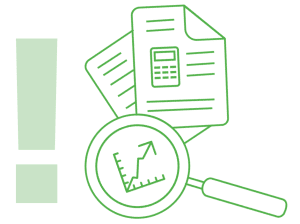How can disputes with tax authorities affect doing business in Poland? Contrary to appearances, enterprises that avoid discussions with the tax office (or, more broadly, the National Revenue Administration) at all costs can lose a lot and actually get themselves into trouble. So why shouldn't disputes be avoided? And how to prepare well for possible disputes with tax authorities? Przemysław POWIERZA, Tax Partner at RSM Poland, talked about this with "Dziennik Gazeta Prawna" - a nationwide legal and economic daily.
RSM Poland is a large law firm that advises larger and smaller enterprises on taxes. What is your approach to the dispute with the National Revenue Administration?
Primarily, we do not avoid these disputes. First of all, we know from experience that this strategy is not very effective in establishing secure relations with the Tax Office. Secondly, the approach is important: whether we treat the dispute as an introduction to a fight or a discussion with representatives of the tax administration. We definitely take the latter approach.
Looking at the mentality of Polish entrepreneurs and their accounting teams, I have the impression that we rather prefer to avoid these disputes. As in the Russian proverb: "God keep the Tsar in good health and as far away from us as possible." And this is probably the most popular approach to contacts with the tax office. What is your opinion?
Yes, among Polish entrepreneurs and accounting teams there is a belief that good tax management means peace of mind on this section of the front, it means keeping The National Revenue Administration officials as far away from the company as possible. As soon as the first contact appears, such an entrepreneur - or his accountant - tries to overload the official with a lot of information and documents, hoping that in this way they will get this peace of mind. And it is not.
So an RSM Poland tax advisor comes to the company and says: "Get ready for disputes with the tax authorities"?
Yes - and we usually encounter a defensive reaction, customers expect that we will have to prepare for a fight. And we say: “get ready for a tax dispute, i.e. start talking to the tax office as often as possible; treat it as an opportunity to get to know the other side's position and see if your way of solving the tax problem is the right one.' A passive attitude – i.e. avoiding a tax dispute – may turn out to be the way to the most costly consequences, i.e. to a confrontation before an administrative court.
So when does this dispute start and what to do to prevent it from turning into proceedings before administrative courts?
In fact, the dispute begins practically with the first contacts with the Tax Office, when a company operating in Poland receives an innocent call to clarify minor doubts as part of the so-called checking activities. These can be questions about minor discrepancies or requests to clarify the subject of a transaction.
The most common reaction of accounting departments is to provide clerks with extensive documentation – often "in excess". They hope that in this way they will present an attitude open to cooperation. And in this case it is one of the worst solutions. You should do exactly the opposite: determine where the obligations to provide information or data to the Office end at a given moment and wait for the officials to clarify these inquiries further. Then it will probably be possible to determine in which direction this (yet) "mini-dispute" is heading.
Learn more about resolving disputes with tax authorities
So the correct reaction should be: prepare tax documentation, but only provide as much information as "the law requires"?
Exactly. We always encourage you to carefully check the legal basis of the summons (i.e. which paragraph - colloquially speaking - the official uses to obtain information from us or ask us to submit specific documents).
It is very important to receive it in writing, because then the official is obliged to present a specific tax law provision on the basis of which he summons us. And sometimes the official "proposes" a faster solution to the case: telephone, e-mail - a form without a written summons... Let's not be fooled by the impression that a less official way will be better for us: without a summons there will be no trace in our taxpayer files and - if in the future, it turns out that an innocent checking activity turned into a dispute - we will not have a “history" of this case, no comment or explanation. It will also not be known how the data was interpreted by the office.
Also, for your safety and peace of mind, you should always ask for information in writing and only answer the questions listed in that letter. In the case of contact with the tax office, the saying "less is more" works perfectly.
In order to be well prepared for disputes, it is worth preparing appropriate procedures from the beginning, thanks to which we will always have appropriate documents and we will know why we interpret the provisions in this way and not otherwise, right?
Exactly. For this reason, we absolutely advise against dealing with matters over the phone, without documenting contact with the tax office. As I mentioned at the beginning - this is what you can do with small things, but you have to be sure that it is really a trifle, because something bigger can also result from a small thing.
A good solution is to train specific people who will have "exclusivity" to contact the tax authorities. Thanks to this, these people will expand their knowledge by conducting conversations with officials, and at the same time, in a natural way, they will be able to properly protect the company against the transfer of undue information. Knowing how the procedures work, these people will be able to react assertively and will not be afraid to say no, because they will be sure that they are acting in accordance with the law. I often encounter doubts such as that you are not allowed to refuse the officials, because it will end with an inspection - nothing could be more wrong! The activities of the tax authorities, including inspections, are not ad hoc - these are pre-planned procedures.
Paradoxically, the easier it is for an entrepreneur to enter into a discussion with officials and the more substantively he answers, demonstrating knowledge of his rights and obligations, the less willing The National Revenue Administration authorities are to carry out inspections of him. When a company is represented by a professional who communicates with officials in "their language", it builds the image of a "tax-controlled" business. On the other hand, there is a suspicion that the inspection may not bring the expected results (i.e. finding irregularities) and such an entity becomes "less promising".
Therefore, I will repeat once again: in practice, it is more effective to be a formalist than a polite taxpayer who, in the name of good cooperation with the office, provides more than the official expects.
Where can entrepreneurs look for knowledge if they want to prepare themselves for a tax audit?
Tax Ordinance - this should be the first choice of every taxpayer. This is an act that governs all procedures when it comes to contacts with The National Revenue Administration - and this basic knowledge is absolutely necessary. Therefore, if you have your own financial and accounting team, training (at least on a basic level) specific people in these procedures is a good investment in tax security.
A good solution is also constant cooperation with tax advisors. In a situation where the internal team diagnoses a topic that goes beyond its competence, then we have the opportunity to quickly consult it with people with more knowledge - and then join forces. You can also go through certain stages together with a tax advisor or, after a certain stage, hand over the case to a professional. It is also worth mentioning the psychological aspect of this solution: when an advisor appears in the case, officials receive a signal that we are entering a higher level in terms of substance. Of course, this may be perceived differently by The National Revenue Administration, so it is worth thinking carefully beforehand at which point in the dispute with the tax authorities the advisor should step in, so as not to build unnecessary tension in contacts with the Office.
To sum up: it is worth having people who will be able to talk factually with officials on such current matters, but also have a plan B in the form of a proven tax advisor. And not only for the purpose of representing the company in topics of a heavier caliber, but also to have a broader perspective on a given issue. Let's not forget that a tax advisor is also often there to find more than one solution and to determine the level of risk for each of them. In the end, of course, it is the taxpayer who makes the choice, but thanks to the tax advisor, he has more data necessary to assess the potential benefits and risks.
A tax advisor is often associated with the term "tax optimization", and this is associated with scheming. How should entrepreneurs approach this?
Unfortunately, in recent years the word "optimization" has been forcibly pushed into the vocabulary of curses - no small merit of the Polish legislator. I absolutely disagree with that. It's not that optimization is a bad thing, but it is definitely more difficult today than a few years ago.
Currently, the regulations are drastically more complicated, the frequency of changes in the tax law is absurd, and the legislative sloppiness has reached some exorbitant proportions ... All this means that we operate in a very high uncertainty when it comes to tax jurisprudence, and in these conditions, making a sensible, safe optimization - that is, when I pay the minimum taxes I have to pay - is extremely difficult. At the same time, I want to be clear here: optimization does not mean avoiding paying taxes!
You must not avoid paying taxes or circumvent tax laws, i.e. do things that qualify as crimes. However, you can try to pay as little as possible according to the regulations. Just this: today a a million dollars for whoever is able to say: "I am 100% sure of this solution and no one will find a gap in my interpretation of the law".
Already at the moment tax jurisprudence is structured in such a way that it is very difficult to say with absolute certainty what is still allowed. There are also much fewer optimization possibilities (but they are still there).
If someone wants to use them, it is best to do it with a tax advisor, because in today's conditions it is a little more complicated, but still possible to implement.





